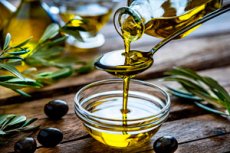Nye publikasjoner
Jeg har ikke råd til olivenolje - hva annet kan jeg bruke?
Sist anmeldt: 02.07.2025

Alt iLive-innhold blir gjennomgått med medisin eller faktisk kontrollert for å sikre så mye faktuell nøyaktighet som mulig.
Vi har strenge retningslinjer for innkjøp og kun kobling til anerkjente medieområder, akademiske forskningsinstitusjoner og, når det er mulig, medisinsk peer-evaluerte studier. Merk at tallene i parenteser ([1], [2], etc.) er klikkbare koblinger til disse studiene.
Hvis du føler at noe av innholdet vårt er unøyaktig, utdatert eller ellers tvilsomt, velg det og trykk Ctrl + Enter.

Vi har hørt om helsefordelene ved olivenolje i årevis. Mange av oss tilsetter den i salater, bruker den til baking og steking.
Men under en levekostnadskrise kan slike høye priser gjøre olivenolje uoverkommelig.
La oss finne ut hvorfor olivenolje er etterspurt, hvorfor den er så dyr nå og hva vi skal gjøre til prisene faller.
Minn meg på hvorfor olivenolje er så bra for deg? Å inkludere olivenolje i kostholdet ditt kan redusere risikoen for diabetes type 2 og forbedre hjertehelsen gjennom bedre blodtrykk, betennelse og kolesterolnivåer.
Dette er hovedsakelig fordi olivenolje er rik på enumettede fettsyrer og polyfenoler (antioksidanter).
Noen forskere har antydet at du kan få disse fordelene ved å konsumere opptil 20 gram per dag. Det tilsvarer omtrent fem teskjeer olivenolje.
Hvorfor er olivenolje så dyrt nå? Europas varme og tørke har begrenset spanske og italienske produsenters evne til å levere olivenolje til internasjonale markeder, inkludert Australia.
I tillegg til dette kom en uvanlig kald og kort vekstsesong for australske olivenoljeprodusenter.
Lav produksjon og tilbud av olivenolje, kombinert med økt etterspørsel fra forbrukere, har ført til stigende priser.
Hvordan kan du bruke olivenolje mer effektivt? Mange husholdninger kjøper olivenolje i store mengder fordi det er billigere per liter. Så hvis du fortsatt har litt til overs, kan du forlenge levetiden ved å:
- Riktig oppbevaring av olje – Sørg for at lokket er godt lukket, og oppbevar oljen på et kjølig og mørkt sted, for eksempel i et spiskammers eller skap. Ved riktig oppbevaring kan olivenolje vanligvis vare i 12–18 måneder.
- Bruk en sprayflaske – sprayflasker fordeler oljen jevnere enn store flasker, og bruker mindre olivenolje totalt sett. Du kan kjøpe en sprayflaske for å fylle på fra en større krukke etter behov.
- Sil eller frys oljen – Hvis du har olivenolje til overs fra steking, sil den og bruk den til andre stekte retter. Du kan også fryse den brukte oljen i en lufttett beholder, tine den og steke den med den senere uten at det påvirker smaken og andre egenskaper ved oljen. Men til dressinger, bruk bare fersk olje.
Jeg er tom for olivenolje. Hva kan jeg bruke i stedet? Her er noen sunne og billigere alternativer til olivenolje:
- Rapsolje er et godt alternativ til steking. Den har relativt lite mettet fett, så den regnes som sunn. I likhet med olivenolje er den rik på enumettet fett.
- Solsikkeolje er et godt alternativ til salater eller steking. Den har en mild smak som ikke overdøver andre ingredienser. Noen studier tyder på at bruk av solsikkeolje kan bidra til å redusere risikoen for hjertesykdom ved å senke LDL (dårlig) kolesterol og øke HDL (godt) kolesterol.
- Sesamolje – har en nøtteaktig smak. Den passer til asiatiske dressinger og steking. Lett sesamolje brukes vanligvis som en nøytral matolje, mens ristet sesamolje brukes til å smaksette sauser. Sesamolje er rik på antioksidanter og har betennelsesdempende egenskaper. Sesamolje selges vanligvis i mindre flasker enn raps- eller solsikkeolje.
Hvordan kan du bruke mindre olje i det hele tatt? Å bruke mindre olje når du lager mat kan holde måltidene dine sunne. Her er noen alternativer og tilberedningsteknikker:
- Bruk bakealternativer – Hvis oppskriften din krever mye smør, kan du prøve å bruke alternativer som eplemos, gresk yoghurt eller most banan.
- bruk kokekar med slippbelegg – bruk av kvalitetsgryter og -panner med slippbelegg reduserer eller eliminerer behovet for olje når du lager mat.
- damp - damp grønnsaker, fisk og fjærkre for å bevare næringsstoffer og fuktighet uten å tilsette olje
- Stek eller stek – Poteter, grønnsaker eller kylling kan stekes eller bakes i ovnen i stedet for å stekes i panne. Du kan fortsatt oppnå en sprø tekstur uten behov for mye olje.
- Grill – De naturlige fettstoffene i kjøtt og grønnsaker kan bidra til å holde ingrediensene fuktige uten å bruke olje.
- bruk kraft - i stedet for å steke grønnsaker i olje, prøv å bruke grønnsakskraft eller kraft for å tilsette smak
- prøv eddik eller sitrusfrukter – bruk eddik eller sitrusjuice (som sitron eller lime) for å tilsette smak i salater, marinader og sauser uten å bruke olje
- Bruk naturlig fuktighet – Bruk den naturlige fuktigheten i ingredienser som tomater, løk og sopp til å tilberede uten å tilsette olje. De frigjør fuktighet under steking, noe som bidrar til å forhindre at de setter seg fast.
